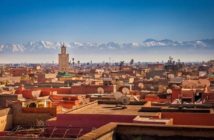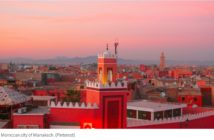NEW YORK TIMES
 Fadel Senna/Agence France Presse — Getty Images
Fadel Senna/Agence France Presse — Getty Images
Tailored travel may bring sights beyond the usual tourist fare, like tree-climbing goats in Morocco.
MORE wealthy travelers are skipping packaged tours and choosing tailored trip itineraries that fit individual interests, needs, schedules — and even whims.
“There is a surge of people looking for the meaningful experience,” said Lynn Cutter, executive vice president for travel at the National Geographic Society. The demand for something other than cookie-cutter tours has prompted the organization to explore adding more bespoke travel to its thick roster of expeditions around the world.
“Millionaire travelers want no surprises, but they do want convenience and experiences to distinguish themselves from their peers,” said Henry Harteveldt of Atmosphere Research Group, a travel research organization.
Whether intended to celebrate a milestone birthday or just for fun, these “curated” trips can be offbeat, like seeing tree-climbing goats in Morocco; exclusive, like a tour of private tombs in Egypt’s Valley of the Kings; or adventurous, like soaring over the African veld in a hot-air balloon. But the experience needs to be seamless as well as terrific.
Stephen E. Green, a retired investment banker from Commack, N.Y., saw the goats near Essaouira during a recent trip to Morocco. A photography buff, he loves the hard-to-get angle. When he and his wife, Myrna, planned a trip to India in 2009, he asked Rob Veden, manager of private travel for Abercrombie & Kent, the luxury travel purveyor, to arrange access for him to capture a special view of the Taj Mahal.
“I was able to take a photograph of a man with a camel behind the Taj Mahal, with the water in the moat,” said Mr. Green. “It’s a view you don’t often see.” He and his wife often travel privately, or with another photography-loving couple, so they can linger as long as they want for the perfect pictures.
“People increasingly want to travel at the pace they want and with a degree of flexibility,” said Mr. Veden. “And what they want to do may not fit with group dynamics.”
Such private arrangements occupy a large portion of Abercrombie’s business, but well-off travelers who want to design the trip experience are also turning to boutique-type services like the NextGreatPlace and Quintess Beyond for locations, hotels and service that have been screened and approved in advance.
When Surinder Tayebi and her family decided to travel to Botswana and South Africa last June, they turned to Quintess Beyond to organize the trip. They traveled with 10 people, including six children. The youngest was 8 years old.
“We wanted to see different countries, but not too many, and we wanted things for the children to do so they could understand Africa,” she said, in an interview from her home in San Diego. Their experiences included cooking, identifying medical plants, making slingshots and visiting local schoolchildren in a village near South Africa’s Kruger National Park.
They liked the 12-day trip so much — especially flying in a helicopter over herds of elephants and hippos lounging in a nearby river — that Dr. Tayebi, an obstetrician-gynecologist, posted pictures and a description on the Quintess blog.
The hotels and safari camps, the activities and staffing on her trip were all given the seal of approval by Quintess Beyond, an agency in Broomfield, Colo., started by Ben Addoms. He first began Quintess, a collection of luxury rentals, in 2004, then began offering trips for the group’s 600 members (as well as about 60 large corporate clients). They pay fees on a scale that starts at $10,000.
Another custom travel specialist is NextGreatPlace, which charges an annual fee of $500, which covers planning for all of a member’s trips each year. Its chief executive, Tom Filippini, decided to start what he called the “Netflix for travel” after trying to book a longer-term stay in Belize in early 2010 for his wife and two young children, but could not find what he wanted on Web sites.
“I decided to fly there, and it was a real eye-opener. Some well-rated properties had been Photoshopped, and one even had a jaguar — behind some chicken wire — and monkeys with chains around their necks in the lobby area. That was not for us.”
The challenge convinced him that there was a market for travelers who wanted prescreened and handpicked experiences and destinations.
“The Internet was too overwhelming, and people wanted places that are verified. They want to make sure that their experiences are great.”
A client, Taylor C. Kirkpatrick, 39, of Denver, said: “I skip all the trepidation leading up to a trip. I don’t need to wonder whether something will work out when I’m traveling with my wife and 14-month-old son.
“Someone else takes control of the logistics so we don’t sweat the details,” said Mr. Kirkpatrick, the head of the family financial office for Babson Farms in Chicago. The current average for trips booked by NextGreatPlace is $3,000 to $5,000, but Mr. Filippini says “sometimes people book something slightly lower and often much higher.”
Those who want a precise experience are often in the “millionaire traveler” category, which Atmosphere Research Group defines as a person who has $1 million or more in assets (not counting residence or retirement accounts) and travels at least once a year.
Such travelers “are tech-savvy, independent and value-focused,” he said, based on his company’s survey of the 1,004 millionaires in the last quarter of 2011.
Most are baby boomers. The average age of the millionaire traveler is 52, and 46 percent say they work full time, according to survey results. About one-third of travelers who are employed, either full or part time, are business owners.
Travelers who are younger than 45 “will pay more to save time, reduce stress or hassle, or enjoy better service,” the survey found. But such travelers are also particular and will remain loyal to a brand or service as long as it delivers what is expected, according to the report.
“They want trips that are distinct and authentic plus have comfort and privacy,” said Mr. Harteveldt.
In recent years, more trips are being planned around a once-in-a-lifetime event, said Geoffrey Kent, founder and executive chairman of Abercrombie & Kent.
“We are seeing a dramatic increase in ‘celebration vacations’ or holidays shared with family and friends, which now account for more than 15 percent of our bookings,” he said.
Ms. Cutter, at National Geographic, which so far offers only privately planned African safaris, said, “We have definitely seen a lot of people celebrating family events and who are asking for in-depth explorations of destinations.”
Smithsonian Journeys, the travel arm of the Smithsonian Institution, began offering individually customized travel last year, also because of a rise in demand, said Amy Kotkin, the program’s director.
“We had a family of travelers who had an elderly parent, children and grandchildren and that made us realize that there was a definite need for more individual offerings,” she said. Trips can be booked, with a study leader, for as few as two people and as many as 14, as long as the stay is seven days.
Typically such travelers spent between $4,000 and $10,000 a person per trip. Some travel planners say that there may be a premium of 10 to 15 percent over prepackaged travel, depending on the luxury level of the accommodations and experiences.
For those who want the supreme bragging right — an around-the-world trip by private jet — it’s best not to dawdle. A National Geographic trip, limited to 76 travelers at $72,950 a person double occupancy, already has sold out for February. Ms. Cutter said a second trip, planned for next October, was still available.






